Deportations of Pontian Greeks in 1942 and 1944: Examining the Causes, Scale, and Locations
Find out how Soviet authorities uprooted over 30,000 Greeks from their historical homelands in 1942 and 1944 without any justifiable reason.
Encyclopedia
Emerging victorious from World War II, the Soviet Union nonetheless faced a precarious economic situation. Alongside post-war reconstruction efforts, ethnic purges aimed to shape a “Soviet person” devoid of unique traits, targeting the indigenous populations in the process. All of this was done in an effort to reshape the world anew.
In 1949, four years after the end of World War II, the Soviet regime forcibly relocated over 37,000 ethnic Greeks from Ukraine, the Black Sea region, and the Azov Sea area. This article explores the reasons for the 1949 deportation of Pontian Greeks, the sequence of events, and the conditions under which the deportees lived.
The recurring oppression of the Greek ethnic group along the Black Sea coast is highly revealing. From 1938’s repression to 1942’s first deportation, 1944’s second deportation, and finally 1949, significant actions were taken every 2 to 5 years to annihilate the Greeks.
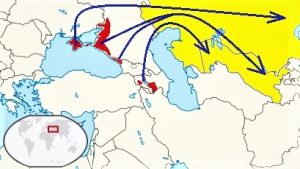
Map of 1949 deportation
If the deportations during World War II could be manipulatively justified by collaboration with the Nazi occupiers, the rationale four years after the war’s end appears even more fictitious:
The Central Committee of the Communist Party of the Soviet Union (Bolsheviks) made a completely secret decision on May 17, 1949, according to protocol № 69 from a Politburo session. This directed the Ministry of State Security (MGB) of the USSR to deport Greeks with the objective of “cleansing the Black Sea coast of unreliable elements” [8].
The resolution was enacted to oblige the Ministry of State Security of the USSR to relocate all Greek citizens, as well as former Greek citizens, who had acquired Soviet citizenship and were living on the Black Sea coast in Georgia and Azerbaijan. They were to be moved to the South Kazakhstan and Zhambyl regions of the Kazakh SSR. Deportees were permitted to bring personal belongings and food up to 1,000 kg per family. The Ministry of Internal Affairs of the USSR was obliged to provide escort, transportation, and oversight of the resettles, as well as securing employment for them in their new residences.
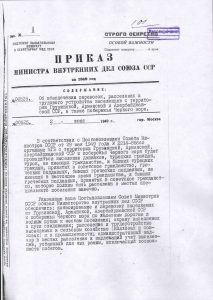
Decree № 00525 (page 1)
The plan also indicated the number of Greek families to be deported: 6,000 families (21,600 people) were to be sent to the Dzhambul region, and 1,500 families (5,400 people) to the South Kazakhstan region [6].
The primary task for the military during the initial phase was to remove people from their homes, followed by transporting them to the railway stations. In line with this, Decree № 00525 was issued on June 2, 1949, titled “On Ensuring Transportation, Resettlement, and Employment of Deportees from the Territories of the Georgian, Armenian, and Azerbaijani SSRs, as well as the Black Sea Coast.” Instructions were issued to strengthen the security of the state border in areas where deportations were taking place and to maintain proper public order in the settlements targeted for deportations.
On the night of June 12th to 13th, 1949, all Greek villages in Abkhazia were surrounded by troops from the USSR Ministry of Internal Affairs. An officer armed with a gun and two soldiers carrying assault rifles entered each yard. The officer announced the family’s eviction and verified the presence of each individual against a list. The Greeks were given two hours to gather their personal belongings and food. By noon, they were transported out of the mountainous areas, with three families per truck, and by evening, they arrived at the railway station in Sukhumi, Abkhazia. If there were delays in transportation, soldiers armed with assault rifles guarded the deportees as though they were criminals.
The Greeks were placed in 60-ton freight cars that had previously been used for transporting cattle. The wagons were fitted with wooden bunk beds. Children and young people were placed on the upper tiers, while the elderly and sick were accommodated below. Concerns arose about surviving without food and water in the heat, particularly for children and the sick who lacked medicine and medical care. Although doctors were officially assigned to each train, the medical care was subpar, and people died en route. The cars were stifling, and there were no toilets.
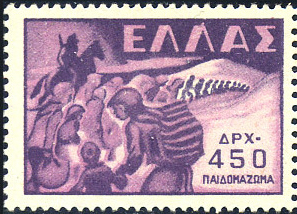
A Postcard depicting the deportation of Pontian Greeks
Subscribe for our news and update
Christopher Keshanidi, a Pontian Greek, documented his fellow villagers’ memories of the journey: “At first, we were transported in locked wagons. Soon, children and the sick began to die due to the unbearable conditions. During stops at junctions, we, along with our soldier, dug pits not far from the train. The dead were placed in sacks, thrown into the pits, and covered with soil. When there were delays, the locomotive would sound short horns several times, signaling that someone was being buried. Soon, we contracted scabies and lice. We used a kerosene-soaked rag to wipe affected areas; the lice died and were removed by combing…” [5, p. 49]
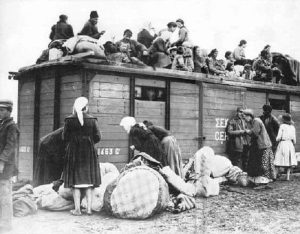
On June 14, 1949, two echelons carrying Greek deportees from Azerbaijan, Armenia, and Georgia converged at the Makhachkala station. Security allowed passengers to disembark and stretch their legs. Hristo Tiftikidi, originally from Baku, stepped off the train with his lyre and began playing a Pontian melody. The event is described by witness and brother, Mykola Tiftikidi, as follows:
“The Pontians, stirred by the lyre’s music, began to engage in a group dance. It contained everything: anger and despair, pain and joy, uniting people whom fate had brought together in a grim moment into one body and one soul. The dance reignited a sense of camaraderie that had long been dormant among the Soviet Greeks. It was as if the thousand-year-old voices of their distant ancestors were speaking through them. They danced with such fervor, rage, and passion that it seemed they wanted to drown their sorrow in the dance, stomp it into the ground, and express contempt for the guards accompanying the echelon. The dance was as beautiful as the Parthenon and as monumental as a fresco” [4].
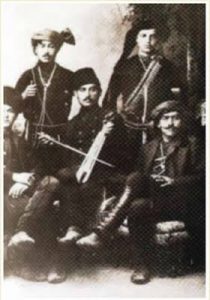
Pontian Greek Musicians
Upon reaching their destinations, the Greeks were required to sign a “consent” form for permanent settlement. Greek citizens had their passports confiscated and were issued special expellee passports. According to various sources, in 1949, the Soviet authorities deported more than 37,108 Pontian Greeks [4].
In total, 26 trains carrying deported ethnic Greeks were sent to Kazakhstan in 1949. The majority of them originated from Georgia, accounting for 19 trains.
Most Greeks were settled in the South Kazakhstan region, centered around the city of Chymkent. The primary crop in this area was cotton, but apples and grapes were also cultivated, offering Greeks a reminder of home. Many found employment at the Mirgalimsai lead mine, while others joined collective farms. Greeks from the Odesa and Izmail regions were deported to the Alma-Ata region, where they were also integrated in collective farms.
Accustomed to a subtropical climate, the Greeks faced harsh winters with snow depths exceeding 50 centimeters and prolonged frosts that saw temperatures plummet to minus 51 degrees Celsius.
In his memoirs, Christopher Keshanidi, a deported Greek, wrote: “The only place to find out who had passed away or who was still alive was the Sunday market in the district center. Within 3–5 years, most of the children, the sick, and the elderly, including my father, had died. He struggled to adapt to the extreme continental climate. Tormented by his unjust circumstances and the merciless attitudes surrounding him, he couldn’t come to terms with the grim fate that had been prepared for us. Ultimately, he fell seriously ill and passed away…” [5, c. 52].
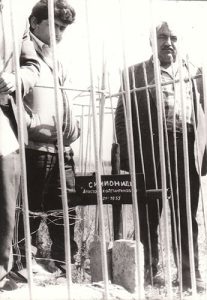
Pontian Greeks at a Cemetery in Deportation
In addition to these challenges, the deported Greeks faced strict movement restrictions. They were not allowed to travel more than 25 kilometers from their settlement without proper authorization and identification. Unauthorized departure from the special settlement carried a penalty of 20 years of hard labor. Those caught attempting to return to their former homes were apprehended by Soviet authorities and sentenced to five years in labor camps [3, p. 216].
Beyond these severe penalties for wanting to return to their ancestral lands, ethnic Greeks also lost their original places of residence in a symbolic way. The Soviet government renamed settlements and cities to erase collective memory. For instance, this renaming strategy played a role in the USSR’s creation of the “Russian Crimea” narrative. By a decree issued on May 18, 1948, settlements inhabited by Greeks were renamed: Kapikhor became Morskoye, Partenit was changed to Frunzenskoye, and Melas was renamed Sanatorium. The Soviet government replaced the indigenous names with Russian one.
From a letter by deported Greek A. Parochidi to the Greek Ambassador in Moscow:
“On June 13, 1949, the army expelled all Greeks from the Caucasus, not permitting them to take any essential belongings, and now some Greeks live in stables, while others are without shelter, living on bare ground.
Now, the Greek people have nothing. They are forced to work as special migrants without pay and are treated like cattle, and the whole nation is sick, all hospitals are overcrowded, and recently, doctors have even stopped admitting them, leaving the sick to die without medical care.
The Greek people await their return to their homeland with deep hope, seeking divine blessings and assistance from the Greek state” [5].
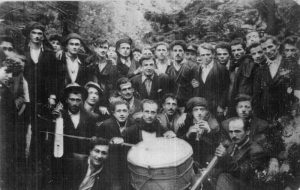
Pontian Greek Musicians
It was only after Stalin’s death in 1953 that rehabilitation occurred and Greeks were granted the right to move freely within the republic. According to a Decree from the Presidium of the Supreme Soviet of the USSR dated March 27, 1956, titled “On the Removal of Restrictions on the Legal Status of Greeks, Bulgarians, Armenians, and Members of Their Families in Special Settlements,” Greeks were finally allowed to return freely to their former residences, including Crimea [9, p. 144]. However, the property confiscated during deportation was not returned, leaving the Greeks without homes to go back to, as others had taken up residence there.
Between 1965 and 1975, 15,000 Greeks emigrated from the Soviet Union to Greece. After the collapse of the Union, approximately 100,000 Greeks left the territories of the former USSR [1]. Unlike many other persecuted ethnic groups, Soviet Greeks never received official rehabilitation under Soviet law [2].
As of 2001, there were 91,500 ethnic Greeks living in Ukraine, the majority of whom were settled in Crimea [7].
The 1949 deportation of the Pontian Greeks, orchestrated by the Soviet regime, marked the final wave in a series of three forced expulsions aimed at extermination. Stalin’s malevolent intentions were realized: the Black Sea region was “cleansed” of Greeks, effectively decimating the Greek diaspora.
Life in exile for the Greeks was extraordinarily challenging. They faced a multitude of hardships, including severe climatic conditions, lack of livelihoods, loss of cultural heritage, and systematic human rights abuses. These adversities led to significant human and cultural losses. The 1949 deportations stand as a dramatic and tragic chapter in the history of the Pontian Greeks, the repercussions of which continue to be felt today.
Anastasiia Saenko, author
Oleksii Havryliuk & Maksym Sushchuk, editors
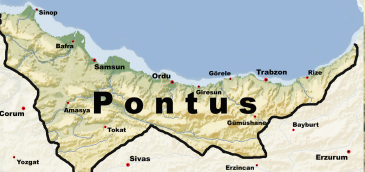
Find out how Soviet authorities uprooted over 30,000 Greeks from their historical homelands in 1942 and 1944 without any justifiable reason.

Discover how the Soviets systematically deported millions from the west of Ukraine, erasing villages and cultural landmarks.
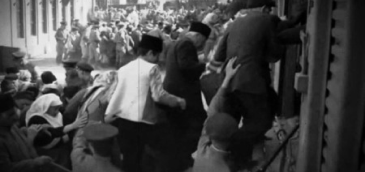
What led to the mass deportation of Crimean Tatars in 1944? Discover the Soviet Union’s motives and the lasting impact on the qirimly community.
and we will send you the latest news